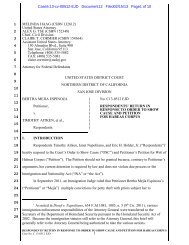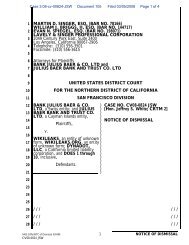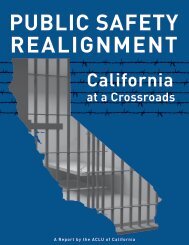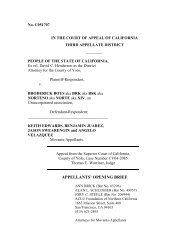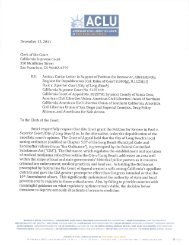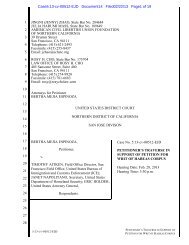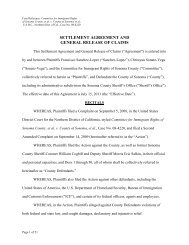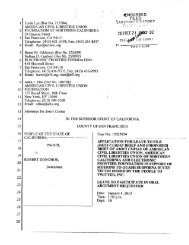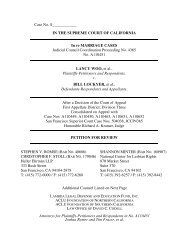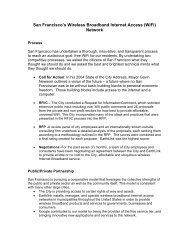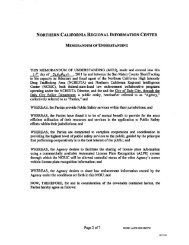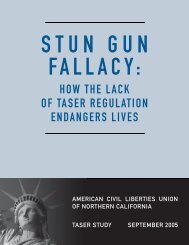1 of 2 - ACLU of Northern California
1 of 2 - ACLU of Northern California
1 of 2 - ACLU of Northern California
Create successful ePaper yourself
Turn your PDF publications into a flip-book with our unique Google optimized e-Paper software.
Case M:06-cv-01791-VRW Document 254 Filed 04/20/2007 Page 21 <strong>of</strong> 3212345678910ll1213141516171819202122232425262728United States has demonstrated that each <strong>of</strong> these categories <strong>of</strong> information is needed to decidethis case, but the disclosure <strong>of</strong> that information reasonably would cause harm to the nationalsecurity. In these circumstances, the Court must grant the United States’ motion.I. (U) WHERE STATE SECRETS ARE NEEDED TO RESOLVE A CASE, THEMATTER MUST BE DISMISSED.A. (U) The State Secrets Privilege Bars Use <strong>of</strong> Privileged InformationRegardless <strong>of</strong> a Litigant’s Need.(U) The ability <strong>of</strong> the executive to protect military or state secrets from disclosure hasbeen recognized from the earliest days <strong>of</strong> the Republic. See Totten v. United States, 92 U.S. 105(1875); United States v. Burr, 25 F. Cas. 30 (C.C.D. Va. 1807); United States v. Reynolds, 345U.S. 1 (1953); Kasza, 133 F.3d 1159. "Although the state secrets privilege was developed atcommon law, it performs a function <strong>of</strong> constitutional significance" because the privilege derivesfrom the President’s Article II powers to conduct foreign affairs and provide for the nationaldefense. El-Masri v. United States, __ F.3d __, 2007 WL 625130, at *8 (4th Cir. Mar. 2, 2007)(citing United States v. Nixon, 418 U.S. 683,710 (1974)). The Supreme Court has also clearlyrecognized that the protection <strong>of</strong> national security information is within the "Executive’sconstitutional mandate," see id. (citing Department <strong>of</strong> the Navy v. Egan, 484 U.S. 518, 527(1988)). Thus the state secrets privilege has a "firm foundation in the Constitution, in additionto its basis in the common law <strong>of</strong> evidence." Id.(U) (1) Procedural Requirements: As a procedural matter, "[t]he privilege belongs to theGovernment and must be asserted by it; it can neither be claimed nor waived by a private7w’ty." Reynolds, 345 U.S. at 7 (emphasis added); see also Kasza, 133 F.3d at 1 t65. "Theremust be a formal claim <strong>of</strong> privilege, lodged by the head <strong>of</strong> the department which has control overthe matter, after actual personal consideration by the <strong>of</strong>ficer." Reynolds, 345 U.S. at 7-8footnotes omitted). Thus, the responsible agency head must personally consider the matter andi~rmally assert the claim <strong>of</strong> privilege.Public Memorandum <strong>of</strong> the United Statesin Support <strong>of</strong> Motion to Dismiss or for SummaryJudgment, MDL No. 06-1791-VRW-13-



